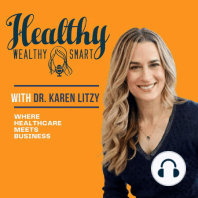60 min listen

527: Dr. Alli Gokeler: Motor Learning & ACL Rehab: Do We Need It?
527: Dr. Alli Gokeler: Motor Learning & ACL Rehab: Do We Need It?
ratings:
Length:
47 minutes
Released:
Feb 22, 2021
Format:
Podcast episode
Description
In this episode, sports physical therapist specialist, Dr. Alli Gokeler, talks about motor learning. Today, Alli tells us about the process of motor learning, how patient autonomy is advantageous to rehabilitation, and how to motivate patients. How does Alli measure motor learning outcomes? Alli elaborates on his on-field rehabilitation model, and the importance of incorporating cognition in ACL injury rehabilitation. Alli talks about RTS from a motor learning perspective, how to continue motor learning on the field, and he gives his younger self some advice, all on today’s episode of The Healthy, Wealthy & Smart Podcast. Key Takeaways Alli defines motor learning: “In order to acquire motor learning, you need to practice. If you don’t practice, you can’t learn something.” “The learning process itself cannot be measured directly. It’s only something you can measure indirectly.” “What motor learning should result in is: it should lead to relatively permanent improvement of motor skills.” “Be careful how you interpret this process. Quite a few clinicians have a tendency to provide feedback because they intuitively try to correct a patient.” “Be a little bit patient with your patient, because learning takes time. Don’t interrupt the learning process too soon.” “Motor learning, as well as learning a language or math, is a non-linear process.” “One of the strong drivers of learning is intrinsic motivation.” “We provide our patients with a significant amount of autonomy, which means the patient gets a certain level of control over the exercises.” “Providing autonomy during rehab enhances learning.” “Around 70% of people prefer to receive feedback after a good performance of an exercise. What happens in most clinical situations, with all good intentions, we typically give corrective feedback, which typically means you didn’t do something according to the standards of the therapist. This may affect their motivation.” “If you look at the brain activity of someone that is instructed to do something, or the brain activity of a person who has some control over what they’re going to do, you have completely different brain patterns. When you give them some control, they are much more engaged, and this is a prerequisite in order to learn something.” “If you want to be certain that learning has taken place, you need to measure, otherwise you can’t be sure that the patient has learnt something.” “If you’re good at something, it’s not challenging anymore. If it’s too difficult, then it’s overreaching.” “One-on-one training is not what’s needed for a football player. They are team athletes.” Alli’s on-field rehabilitation model: Neurocognition: Reaction time, decision-making, selective attention, inhibition and working memory. Motor component: Strength, range of motion endurance, and speed. Sensory: Visual, auditory, and environmental factors. “We need cognition during our motor control, and if we only work on pre-planned activities, we miss something from the on-field situation.” “An ACL injury isn’t just a peripheral injury, but it’s also a neurophysiological lesion, and that needs to be considered in rehab.” “With colleagues that work with paediatric patients, some of the motor learning principles that they use could be very beneficial for us working with orthopaedic, sports-related injuries.” Suggested Keywords Motor Learning, RTS, PDCA, ACL, Rehabilitation, Neurocognition, Therapy, Physiotherapy, PT, Training, Injuries, Sport, Wellness, Health, Recovery, Injury-Prevention, More about Dr. Gokeler Dr. Alli Gokeler has 28 years of experience as a sports physical therapist specialist. In 1990, Alli graduated with a degree in Physical Therapy from the Rijkshogeschool Groningen. Following his graduation, he worked in both the US and Germany as a physical therapist. In 2003, he earned his Sports Physical Therapy Degree from the Utrecht University of Applied Science. In 2005, he started a PhD project at the University Medical Cente
Released:
Feb 22, 2021
Format:
Podcast episode
Titles in the series (100)
068: Ting-Ting Kuo, DPT, WHCS, physical therapist: Ting Ting and I discuss common diagnoses in pre and post natal women and how physical therapy can treat and help prevent these problems. by Healthy Wealthy & Smart